After posting about how we should give grace to movies and not view them with constant hyper critical lenses, I’m here to be critical about The Materialists!!!
What am I if not this?
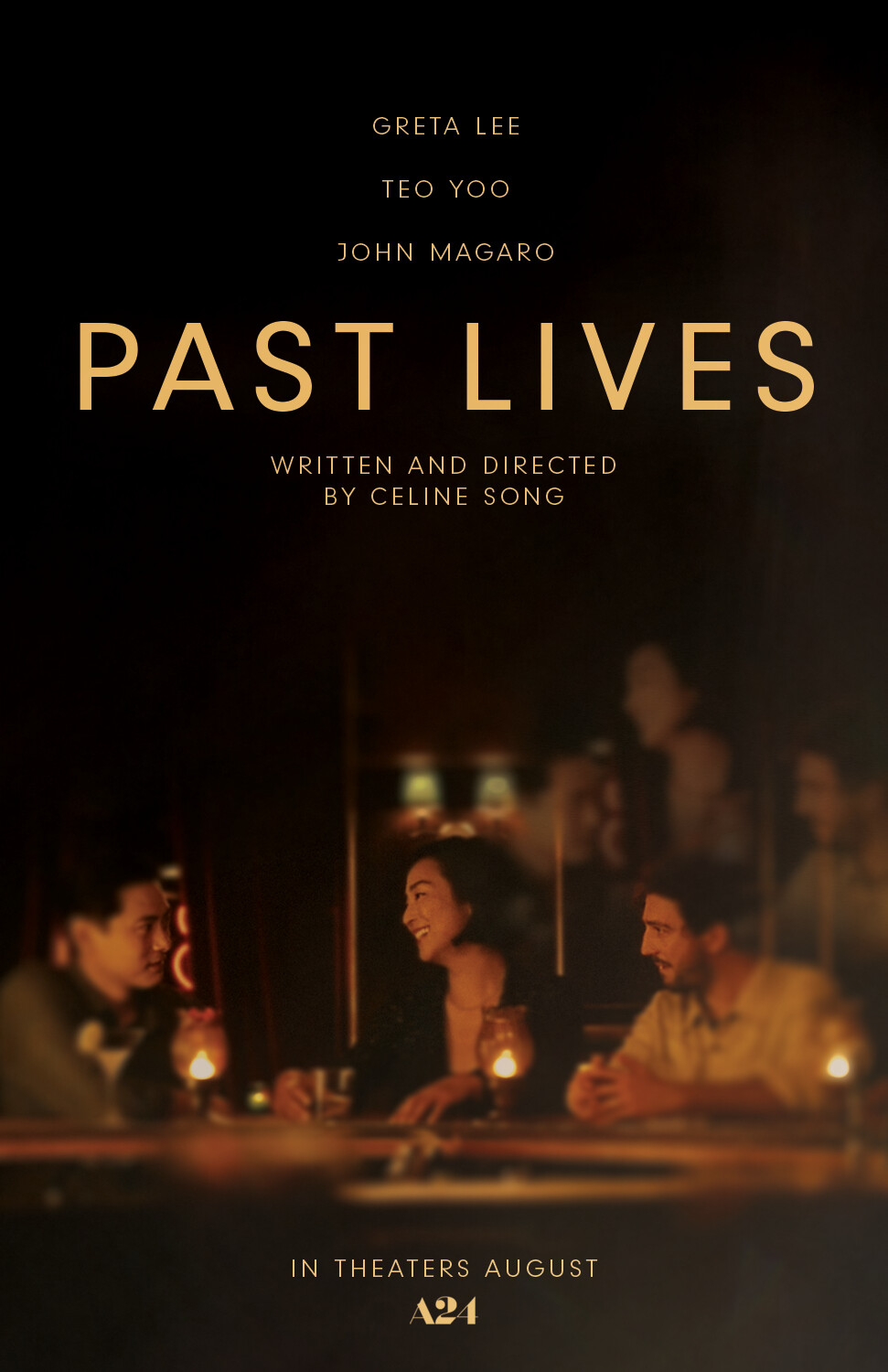
Chapter 0 : The One That Informed My Sensibilities
For context, I watched Past Lives when it first came out in theatres without any idea of what I was getting into. I remember at one point in the middle of the movie I was left thinking I do not think I want to watch it in public like this and also this feels so much more intense on the big screen. Which, a conversation for a different day but the point is the movie managed to deeply move me. I went to watch it with my friend without much thought and I remember being terrified to look at him in the middle of the movie.
It is one of those movies that I can talk about with different contexts at different times stressing different things I got out of it. Even when I was watching it I remember thinking I want to sit in the feeling of this insane dialogue but also I don’t want to close myself off to feeling intensely the next thing that is now happening on screen. It was also very pretty. Celine Song loved her characters in a way where she let all of them take up space on screen.
Honestly, I’ve been a love triangle hater from day one. I left Wattpad books midway when I sensed a love triangle. The concept of a guy who would have to be pointlessly villainized to justify losing the girl did not sit well with me at all. In fact one of the main stories I was attempting to write in my early teens was centered around a girl trying to save the popular guy’s funny best friend from the nerd girl who was going to date him for a month before she leaves him for the jock. (again, a story for another day)
But Past Lives did the thing where I was like yes, this is the kind of story that has a love triangle that does not piss me off. Which, maybe one day I’ll write a review for it but right now I’m just using it to set context for the materialists; that after being so blown away with Past Lives I was looking forward to the next movie!
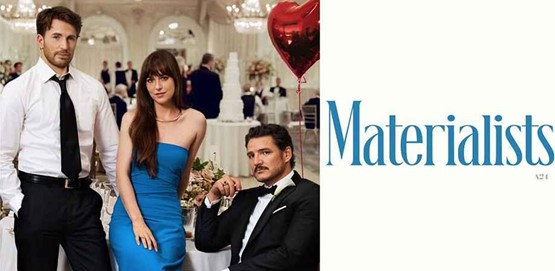
Chapter 1 : The Actual Movie
Understand I went into ‘The Materialists’ after already coming across lukewarm reviews but I thought this is directed by Celine Song, so even if it is not nice it will still give me a lot to think about. Complex interpersonal character dynamics. I’ve come to realise I value this more than any plot anyway. Similar to how I feel about Emily Henry, I might not like all her books but it will definitely give me something to think about.
Also, a lot of movies after the Past Lives and Challengers cycle are doing this love triangle thing but knowing Celine Song had done it right before I was ready for her to show that to me again.
The movie has the sort of clean movie fairy tale look. Not in it’s whimsy but in it’s shiny and glittery. It is after all boasting a backdrop of elite New York. It has the signature themes you’d expect Song to explore like wealth disparity, loneliness of a big city, the cost of choosing to be an artist past your jaded early twenty days. There are characters struggling for money, wishing for money, fighting for money. All of them have demons of different forms, failed careers, families or their appearance even. The premise is great but also a classic romcom dilemma wrapped into one fun but meaningful sort of storyline. Nothing is amiss, when the movie starts I think yes, this is beautiful. There are all the fun shiny romcom elements along with the character depth to make me care about what is happening to them.
Except of course there is something missing, or I wouldn’t be writing this. Nothing fuels my words as much as an almost but not quite situation. The tropes versus plot debate going on in the book community is a very good case of what the crux of the issue is. It is the that things are happening but I do not know or care enough about the characters to rejoice in the events of the story.
So when I came out of the movie theatre (yes, went to watch it on the big screen again) I was formulating my disappointing thoughts but also kind of happy that this kind of movie was being made because they are fun mindless watches. In under an hour (because Instagram tracks my every move) I started getting videos and reels about people complaining about the movie, except except they were all complaining about the absolutely WRONG thing. You know those moments when you find someone who just as passionately and irrationally hate something as much as you do and then as they start their rant you realise, no we are not the same. They hate it for totally different (stupid) reasons? Yeah, this was one of those.
I did try to scroll around to find someone ranting along my lines but none of them hit just right so I decided to write this one myself!
Chapter 2 : For The Love Of Money
Let me start off by saying, relationships with money; complex. We come from different places of privilege and therefore the amount of importance it can hold in a person’s life is always a good thing to explore in media. Lucy has come from a poor household and most of the fights she has witnessed as a kid has been around money. She is someone who has seen first hand that sometimes love is not enough. You need other things to live, it is okay to want good things. Love should not come with that sort of sacrifice. But she also values connection and compatibility. Her whole career is a reflection of that, she views relationships as a complex balance of love and rationale and she wants to strike the perfect balance for her clients and of course unconsciously at some point for herself.
She wants to earn and have enough money to never have to suffer like her parents but also she wants for once in her life to not worry about money. A rich person would be ideal, someone who also doesn’t have to worry about money. Her most serious relationship in the past has been with John, who is and was a struggling broke artist. For the sake of this argument we are to assume they work together really well, have great chemistry (which I didn’t see on screen but ok) but the thing that tore them apart is the lack of money. Lucy realizes she wants nice things and if she keeps dating John the resentment of not being able to have good things will invariably cause her to lash out on him and fracture the connection they have.
Money is the sad sort of reality in her world but also in the world we are participating in today. We are left working and slogging, dreaming and watching good fancy things in the content we consume. Somehow the reality we live in has been warped to the point where it is necessary to be rich to have the basics in life. And when we cannot get that we try to satisfy our desires by watching vlogs and days in the life of XYZs.
I have spent two paragraphs trying to assert that yes, I do understand this and at the same time I disagree with the biggest critic of this movie, in terms of how the characters end up. But more importantly in how people define and box these characters.
Most people on short form content platforms have come out in defense of the rich charming love interest, Harry. Love triangles almost always cause 2nd lead syndrome wherein everyone thinks the girl should have ended up with the other guy. Except the reason that people are using to justify it here is that, he is rich. He has everything she wants. Choosing John over him is just broke boy propaganda. Which which is like missing the MAIN point the movie was trying to make.
Add to this the fact that Dakota Johnson plays Lucy so we see the chemistry between both the love interest to be equally lacking it is actually hard to pick up on who she is suppose to be more attracted to or feel more free around. In fact the movie doesn’t do a whole lot of showing it either. We have no idea why either of them is more than their caricature offers, broke man versus rich man. And in that context, with those being the only difference between them I will extend an olive branch to the Harry Supporters and say, yes I understand why you’d think he was a better option.
The movie however is called ‘The Materialists’ and it invites us from the very start to question our material instincts. There are introductions of themes and concepts that have invariably informed our sensibilities and we are meant to question if they make sense in real life. Can we really control our relationships if we have control over a couple of variables that dedicate their outcome? Maybe in a controlled environment where constants and assumptions stay static, but what of real life? You cannot formulate any theory scientific or otherwise without assumptions and yet how valid are these assumptions in the volatility of what we call our real life?
Celine Song is a great story teller because she doesn’t villainize one of the love interest to justify the protagonist ending with the other. But what happens when she doesn’t give any reason to choose the other either? In Past Lives, this works because neither of them were offering something additional to what the other was. They were offering different things (and also had great chemistry might I add). It is ironic to note that a movie that was trying to make a point of how materialism has torn the fabric of our relationships has the audience rooting for the materialist choice.
Chapter 3 : The RIGHT Way To Hate The Materialists
The movie centres around a very pivotal theme. People looking for love and connection and the way companies have tried to capitalize off of it. The dating apps, the constant scrolling for a short dose of dopamine. The way knowing all of this doesn’t change anything. The very real very raw loneliness that has everyone in its grip even when we are around so many other lonely people.
The movie pokes fun at it all. The laundry list of filter like demands woman have for their partners. The inhumane treatment of people when they are reduced to blocks and categories. The very real dilemma we face when we go from viewing people as a list of attributes instead of an evolving changing real person (not us applying the theory of alienation on people1 ). The premise is set up very well, there are real scary questions but there is also light heartedness in the way we approach them.
Harry is introduced as charming and lovable but also rich. He does sound like the perfect guy, on paper. I think the point the movie was trying to drive home was that just ticking all these individual boxes we divide people into is not what makes a person. We are not a sum of our parts, we are more than that and therefore even while being so perfect for her he was not perfect for her.
Did the movie drive this home? I’m not sure. He more or less faded out of view instead if I’m being honest. In fact the series of events that lead to this are contradictory in what they show and what they tell.
Lucy reassures that the reasons things aren’t working out between them is not because of his height, and yet the very scene that spurs their eventual confrontation is when she realises he is fake tall. For a movie trying to drive in the importance of personalities and human qualities over material gains, this scene sure does a huge disservice. BAM! A thing he had no control over gave her the ick, and then he fades into oblivion.
Which brings us to John. What did he offer? Ex from 10 years ago who is still the same as he was then, no character growth visible. He is still at the place he was where she broke up with him. So maybe it is about Lucy then. Her character growth, reprioritizing her needs, stuff like that. A consequence of her materialist choice leading her to realise what is more important to her. Except no. She is never in a dilemma, we do not see why she is making the choice she is. We do not see her have an epiphany that makes her devalue money in her life, we do not see her evolve much in terms of what she wants out of a partner at all.
In this instance, it becomes hard to root for anyone. Our inherent biases are suppose to make us root for different outcomes, but the movie was suppose to come out with it’s stance and tell us why that was the choice it committed to. Song is great at making space for our thoughts, even in Past Lives we are never nudged or told who is suppose to be the right choice. Instead it forces us to sit and think about what we value in our lives and what it can mean in terms of how we shape the rest of our lives. Except, what happens when what these men stand for is not defined at all?
What happens is even the audience who were trying to fill in the movie with their own interpretations are stumped. (and dumbasses like me start crafting a 3000 word think piece because they cannot sense any chemistry between the characters whatsoever.)
This brings me to the other thing that drove me up the wall (for different reasons than everyone else, again).
Over the top dialogues make sense when the premise leads to it. The current trend of trying to redo something that invoked a lot of feeling in people before in some other media is so annoying. Movies see something that worked or became trendy and instantly try to replicate it but only in face value. Which only further helps in taking away from the original and adding nothing to the ones that follow.
Because there is always a reason why the first thing hit, there is a background and a context to it. Stripping that away and trying to recycle the words expecting the same outcome is silly.
Because there is no context of love and longing set up here, John saying the below has made people react so hilariously :
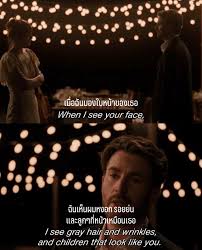
[ when I see your face, I see gray hair and wrinkles, and children that look like you ]
People -
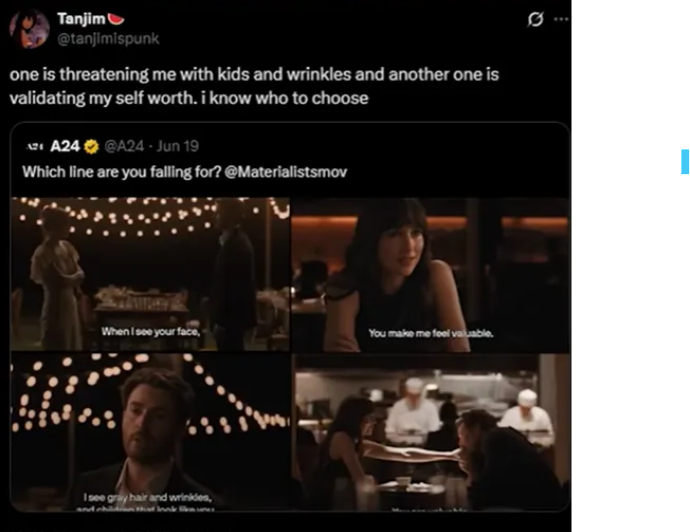
Now this dialogue reminds me of -
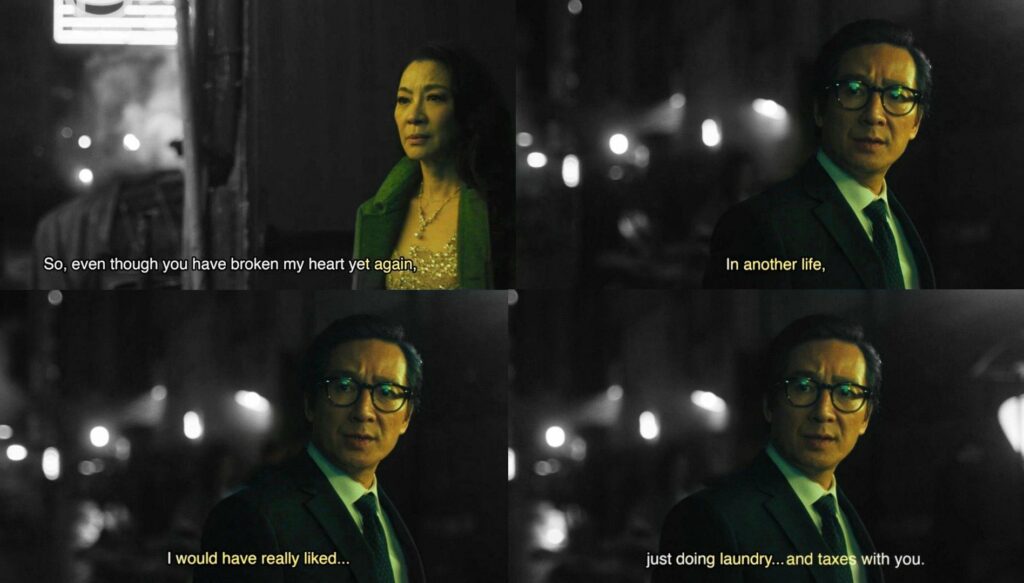
[ In another life, I would have really liked just doing laundry and taxes with you. ]
Which was an intense insane moment!
But in The Materialists we aren’t taken on the sort of emotional roller coaster that makes the EEAAO dialogue so impactful.
Which, finally brings me to my last complaint. The unrealistic ending. It gave me a weird Deja vu because it made me feel exactly how the ending of Happy Place by Emily Henry did. Conceptually, quitting the job and rejecting the promotion makes sense for Lucy’s character but the practicalities of the matter is she is now dating a man who does not have a stable source of income. Against all of her previous inhibitions she has chosen the life for herself which will require her to think about money. And the reality is that she can’t really afford to quit the job she had without a more concrete plan.
My gripe isn’t with her choice with John, it is with the absolute impracticality of ALSO quitting the one stable source of income they could have while they figured things out for themselves. The movie stresses again and again on how the wealthy and the corporations have taken everything away from us but no matter how hard they try they can never take away our ability to love. It can never dictate who and how we love. To quote Song, ‘Love is freedom.’ But to root this love in reality this choice has a consequence. And I would have liked to see them grapple with it. To realise and accept the hardship it will cause but make this choice regardless.
The fairy tale ending is that they choose each other even though they know it won’t be easy, and now they’ll have to figure out how to live their lives, not that she got the man she loves and she got to quit the job she couldn’t find purpose in and it will still all be okay. The beautiful thing isn’t that it all worked out for her in the end, the beautiful thing has to be that she gets to love despite it all.
Chapter 4 : More Such Movies Pls
There are a number of things that have been misses, mainly the weakening of the second half and Celine Song overestimating the audience’s ability to think beyond the binaries to fill in the lines for the story to fully unfold. Midway through writing this, the clip of her from an interview floated up my feed, where she clearly expresses her frustration with having her characters reduced to broke boy and rich man. While all of this and true, there was a disconnect between the translation of her work into the movie, which, despite all its many glaring, obvious faults, was still so important because it gave me food for so many thoughts.
So yes, I do want more such movies. Movies that do not assume the audience are mindless zombies that need you to tell them exactly what to think, fun movies that still hold inside them the space to initiate conversations about reality. Filler feel good movies don’t have to be empty fluff; they can be tasteful fluff. So yes, I would rather have a movie I can rant about like this over an empty string of trending words and phrases strung together to induce short unexplained doses of dopamine within me in the moment but leave me empty guilty hungering for more, right after.
For syntax comments and corrections : Shivom Chaubey
-
Karl Marx's theory of alienation describes the separation and estrangement of people from their work, their wider world, their human nature, and their selves. Alienation is a consequence of the division of labour in a capitalist society, wherein a human being's life is lived as a mechanistic part of a social class ↩